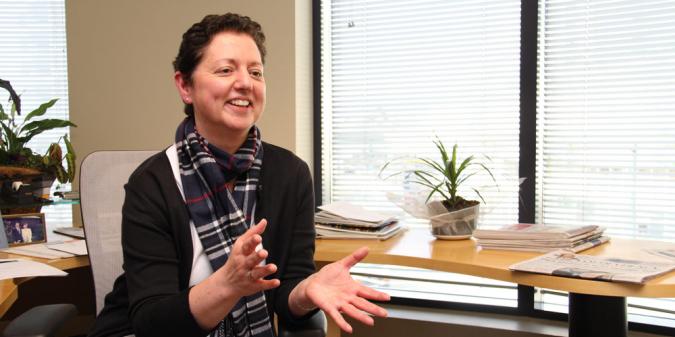An interview with HSA President Val Avery
HSA REPORT, MARCH 2014
Ok, so we have a five year deal. How do you propose to take advantage of the break from bargaining?
Despite the fact that we won't be at the bargaining table, we have some important work to do. The workloads for many professions are causing our members a lot of stress. And when people are under too much stress they do one of two things: they either leave or they go on disability. Neither is good for the health care system. That's why we need to do a lot of work through the new committee on recruitment and retention, and we'll be looking at a lot of new ideas.
It's important to make sure our members are appropriately paid for the work they do, and the classification system just doesn't reflect how jobs have changed over the last 20 years. We need to work on modernizing it so that our members get paid for their expertise, but also so that there is some incentive for people to stay in their jobs, which relates back to the problems around retention. We've got a plan to expedite the backlog of grievances on this.
And we have a lot of work to do around the transition to the 37.5 hour work week because what was agreed to at the table was just not what was implemented. Employers took advantage of the situation to restructure whole departments, and we saw members losing hours, losing earned days off, dealing with big changes to their childcare arrangements and even having to bid on their own jobs. Talk about stressful. So we're going to be dealing with the hundreds of grievances coming out of this and helping our members hold those employers accountable to the agreement.
So we have work to do on a lot of fronts, some of which has come out of bargaining, some of which is ongoing, so we need to take advantage of these five years and get on top of this.
How can we get the government to take problems around shortages and retention more seriously?
It's easy to scream at the government about the need to deal with shortages and increase the size of the schools training the professions, but they immediately throw their hands up in despair because of the money involved. And when it takes six years to graduate in some professions, that approach won't solve the problems we are dealing with today. So we need to talk about a range of solutions. We recently met with Terry Lake, the new Minister of Health, and we're not just talking about larger schools. Maybe we need to look at the selection process so we're not training 60 students who want to be physiotherapists working with athletes in private practice. Maybe that's a screening process, or maybe we need to do education about the value of careers in public health care. Maybe we need to look at incentives to keep them in the province. There are a lot of good ideas out there, like rural communities providing new grads with places to live.
A lot of the time the government doesn't realize the value of our members in relation to the problems they face. We hear a lot about overcrowded emergency rooms and they don't understand that it's social workers, occupational therapists and physiotherapists who play key roles in discharging patients. If there's a shortage if these disciplines, the emergency room backs up. So it's not always about asking for more money. That's why we are working to build relationships with decision makers in government. We're making sure they know that we understand the problems on the front line and they need to pick up the phone when they are considering changes.
HSA has beaten back the first round of raiding by BCNU and UPN. How do we prepare for the next round?
We were very successful in defending against this raid, and when I meet with and debrief some of our RPN members they tell me they were pretty impressed with how HSA stood up for them. Going forward, they would like us to engage with them more often. So that's what we have to do. We need to be even more responsive to the needs of RPNs, so that should we get into this situation again, they'll know that we are there for them, that we want them to be a part of HSA, and that we'll fight to keep them.
What are the biggest challenges and opportunities ahead?
The challenge of getting a break from bargaining is the possibility of losing momentum. That's why we have already started working on a five year strategic plan for HSA so that when 2019 comes around we can go into that bargaining in really good shape.
And our amazingly talented members provide important opportunities. I plan to look at how I can develop them as spokespeople for their professiions and as leaders in health care and community social services. Because I see that as a big part of my job as leader of this organization.
